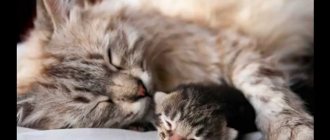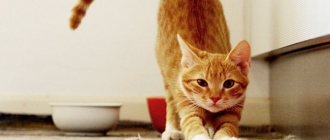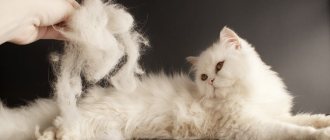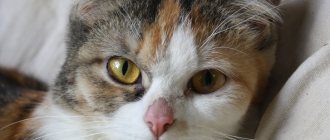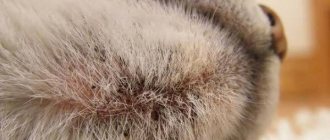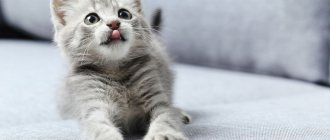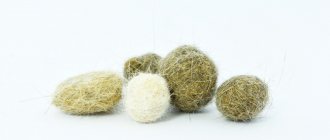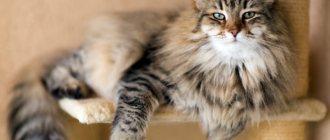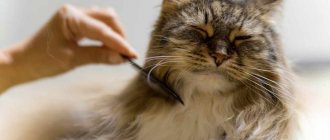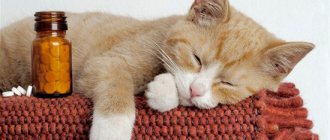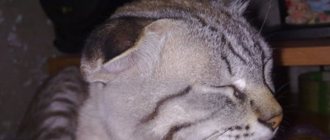What vitamins do cats need?
If your pet’s diet is fairly uniform, constantly consisting of the same familiar foods (for example, poultry and some dairy products), then, on the one hand, this is good. The cat receives the necessary substances from proven sources that do not cause allergies, and absorbs them with appetite. But food is not only a source of fats, carbohydrates and proteins. There are substances that are called bioactive, because without their presence normal processes in the body are impossible. You need very little of them, a fraction of a gram, but their absence has a bad effect on the physical condition of the pet. If we talk about wool, it especially needs the following microelements and vitamins:
- Biotin (or vitamin B7). Its deficiency leads to the development of negative processes in the hair follicles, which provokes hair loss.
- Taurine (an amino acid derivative of vitamin B6). This element is especially important for cats, since it is not synthesized in their bodies. The lack of this substance in the animal’s body leads to serious metabolic disorders, diseases of the gastrointestinal tract and cardiovascular system, decreased visual acuity and eye problems. Of course, this seriously affects the appearance of the cat.
- B vitamins. Promote overall strengthening of the body, have a positive effect on the skin and fur of the animal.
- Calcium. An essential building material that strengthens the teeth, claws and fur of cats.
- Omega-3 and omega-6. Polyunsaturated fatty acids are necessary not only for people, but also for their pets. They ensure normal and harmonious development of the body, therefore they are especially recommended for kittens, pregnant and lactating cats. The largest amount of these substances is contained in fish oil preparations.
- Selenium. A mineral that you only need very little of. It is needed for normal functioning of the thyroid gland and normalization of cholesterol removal. In addition, it is directly involved in the process of hair growth.
- Iodine. It is also necessary for the functioning of the thyroid gland and is associated with many processes in the body, including affecting the brightness of color.
Not every product contains these elements, and in the case of natural feeding, problems with a lack of minerals often arise.
Fungi
Fungal infections, better known as lichen, are characterized by hair loss in certain areas of the skin. If the animal does not receive treatment, the affected areas of skin enlarge and merge together.
Depending on the type of fungus, receding hairline patches may appear clear, scaled, scabbed, or scratched. The first signs of lichen are often overlooked, so for the purpose of prevention, the cat must be completely examined once every 2-3 days. A small, round patch of hairless hair is an almost guaranteed sign of the most common ringworm. Please note that ringworm (and others) is quickly transmitted to people and other animals.
External signs of hair problems in cats
The ideal cat's fur is smooth and shiny. A healthy cat devotes the lion's share of its time to grooming itself, licking its fur. If a pet suddenly neglects “personal hygiene”, its fur becomes dull, brittle and tangled, this is a sure sign of health problems.
- Dull fur.
This symptom can appear with diseases of the intestines and liver. However, it may also be due to an incorrect diet: if the cat does not receive enough fatty acids and vitamins or, on the contrary, receives too much vitamin A, this will affect the condition of its coat. - Hair loss.
All cats shed, this process is especially pronounced in autumn and spring. But if the hair begins to fall out in clumps, leaving bald spots, this is an alarming sign. There may also be a lack of vitamins. In any case, you should urgently seek the advice of a veterinarian. - Tangles.
They talk either about problems with the skin (too much sebum is formed or, on the contrary, excessive dryness is noted), or about the presence of parasites, or about an incorrect diet with a deficiency of vitamins. - Skin problems.
Itching and eczema in the absence of parasites and fungi can be a sign of mineral or vitamin deficiency, allergies and problems with internal organs.
Injuries to the tongue and mouth
Cats create beauty with their tongue - and they have no other tool for combing their hair. Therefore, it is clear that if it hurts them to lick themselves, they are unlikely to do it effectively. But not every cat will allow a person to examine its mouth, especially if it hurts there. If for some reason your pet decides not to trust you in this matter, call for help.
It is best if this is a veterinarian or at least a person competent in handling cats - who knows how to hold them correctly. Perhaps the cat will be offended by you or even bite you, but still examine the oral cavity - the cat’s health is more important.
Follow these recommendations, and you won’t have to think about how to make your cat’s coat shiny with the help of certain additives and shampoos - a healthy and well-groomed cat will already have beautiful shiny coat.
Source
Causes of hair problems in cats
Unbalanced diet.
A cat needs a harmonious diet that suits it. Most dry food manufacturers offer separate lines of food for kittens, neutered cats, pregnant and lactating cats, and weakened animals. As a rule, these foods contain all the necessary mineral and vitamin supplements in the required proportions. But for adherents of “natural nutrition,” it would be a good idea to purchase special vitamin and mineral complexes for your pet.
Insufficient care.
There are contaminants that a cat cannot deal with on its own. If an animal gets dirty in oil, glue, or petroleum products, it must be bathed. Otherwise, the cat may get poisoned when licking. Old animals cannot get themselves in order due to age-related problems.
Stress.
Cats really don’t like moving, they can have a negative attitude towards new people and be afraid of walks. Any nervous shock affects the condition of the animal, which may neglect personal hygiene or devote too much time to it. And some cats begin to shed even more due to stress.
Helminths.
Another common cause of coat problems. Parasites poison the animal's body with the products of their vital activity. As a result, intoxication leads to problems with the coat.
Internal diseases. Hair loss, dull appearance, tangles - all this can indicate health problems, for example, kidney or liver pathology.
Seasonal molt
Oddly enough, most calls to veterinary clinics regarding excessive hair loss in cats occur in the winter. The four-legged animals that came to the doctor look healthy, active and have a good appetite. As for fur, apart from its profuse hair loss, no alarming symptoms are observed.
The reaction of the owners is understandable, because by winter the animal should acquire a luxurious fur coat, and an almost hairless cat without undercoat looks suspicious. However, there is nothing critical in such a situation; a cat can shed in winter.
There are several reasons:
- Natural molting (autumn) can last for 2–3 months.
- A cat may begin to shed if the temperature in the home exceeds 22–25°.
- When heating radiators are running, the air in the house becomes dry, which can lead to prolongation or resumption of shedding.
Note! If the cause of hair loss is shedding, the guard hair should remain healthy, shiny and elastic.
Normally, seasonal molting occurs twice a year (spring and autumn) and lasts up to 3 weeks. In spring, the cat sheds its undercoat and renews its guard hair. By winter, the animal again grows undercoat. It should be noted that cats shed more than cats, and if the home is warm, they can shed all their fur except for the guard (long) hair.
Important! If your cat's shedding is prolonged, she should take a vitamin course to maintain the level of nutrients and trace elements.
Rules for caring for cat fur
Combing.
If an animal has too thick fur, it cannot always get rid of tangles and dirt on its own. The owner should help here. Buy several special combs and brush your cat at least once every three to four days. Soon the pet will get used to this procedure and will independently ask the owners for combing.
Bathing.
You should not overuse bathing. This Sphynx can be bathed once every 1-3 weeks, because these cats “sweat” and require constant water procedures. A cat with lush fur may need to bathe much less frequently. Remember that this procedure causes stress for most animals, so teach your cat to bathe from a very early age and try to make this procedure as comfortable as possible.
Proper nutrition.
A balanced diet is the key to your pet's health. Cats should receive a full range of vitamins and minerals through food. As a rule, cats that eat super-premium food do not need to be supplemented with vitamins, but for those who eat “natural” or economy-class food, supplements will not hurt. You need to select such complexes together with a veterinarian.
Examination of skin and fur.
To monitor your pet's condition, conduct a thorough examination of the coat and skin at least once a week. This will help you spot a problem before it becomes a disaster.
Check your diet
Diet is extremely important for a cat's health. They have their own characteristics in this matter. As you know, cats are predators, in other words, carnivores. Some call them "hyper-carnivores" because, unlike many other carnivores, they truly cannot survive without meat.
We know that cats have a high need for animal protein, but that's not all. They need several special amino acids that are found only and exclusively in meat.
Vitamin and mineral complexes for cat fur
The AVZ company offers a large selection of vitamins for cat fur. Our products have declarations of conformity and undergo strict controls at all stages of production. You can familiarize yourself with these documents in a special section of our website. And in our catalog you will find:
- vitamin and mineral complex "Radostin". Available in several variations - for kittens, for adult cats, for cats over 8 years old, for pregnant cats and for castrated cats. Having a balanced composition, it can be used as a prevention of vitamin deficiency or for treatment;
- solution for oral use "Vittri-1" is ideally balanced, created primarily for kittens, pregnant and lactating cats, providing their body with the necessary fat-soluble vitamins;
- "Fitodoc® Fish Oil" is a valuable source of polyunsaturated fatty acids, rich in omega-3 and omega-6. It is suitable for cats and kittens, ensures harmonious development, has a general strengthening effect and has a beneficial effect on hair follicles;
- “Grass for cats” is an environmentally friendly green food for pets who love to hunt their host’s plants. Contains many ballast substances, vitamins, stimulates digestion.
You can find these and other vitamins for cats against hair loss in our company’s catalog and purchase them at a competitive price from the manufacturer.
